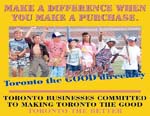

Canadian
Government drags feet on informative garment labels.
Transcript of
CBC Commentary on Wednesday, May 21, 2003
[courtesy of the Maquila Solidarity Network]
Introduction:
For the past few months there been a low-key national campaign going
on. It's all about labelling clothes: forcing manufacturers to say where
they make them. Tanya Roberts-Davis is part of the campaign. She's a
student at Trent University in Ontario. On Commentary she says knowing
where your clothes come from could make a huge difference for the workers
who make them.
Tanya Roberts-Davis:
On campuses
across the country, students have been taking on the global apparel
industry. They've been pinpointing the companies supplying clothing
to our universities. We want to find out where and under what conditions
university clothing is made; we want to support garment workers in their
struggles to win the right to negotiate fair wages and working conditions
without facing any intimidation.
At Trent University I helped launch a student campaign for an ethical purchasing policy. Over the course of three years we pressured and worked with administrators to develop a policy requiring clothing suppliers to abide by basic labour and human rights standards. Finally, in December 2002, the Fair Trade Policy For Apparel was passed.
Companies must tell Trent University the factories they use. However, individual Canadians don't have access to that information, even though a recent poll showed that eight out of ten Canadians want federal regulations that would require companies to tell them exactly where their clothes are made.
When clothing companies can keep their factory locations secret and are allowed to deny any connection between their products and the workers who make them, abuses are far more likely to happen. For example, there are women, right now in Toronto, sewing clothes in their homes for some prominent Canadian retailers and are being paid as little as two dollars an hour. These same retailers also source from overseas factories where workers face intimidation and repression if they try to form a union.
Public disclosure would allow human rights groups to investigate factory conditions and launch solidarity campaigns with workers. It would also enable Canadians to make informed choices to direct our purchasing dollars towards companies that provide fair wages and respect workers' rights.
In February tens of thousands of clothing labels collected by students and concerned citizens were delivered to Industry Minister Allen Rock along with a petition calling for factory disclosure regulations.
For over six months Industry Canada has been reviewing proposals for new disclosure rules. They promised to release a report by the end of February. But two and a half months later we're still waiting to hear their conclusions.
My university has shown that it is possible to require companies to publicly disclose the factories that make our clothes. Now it's Ottawa's turn to act.
For Commentary, I'm Tanya Roberts-Davis in Toronto.